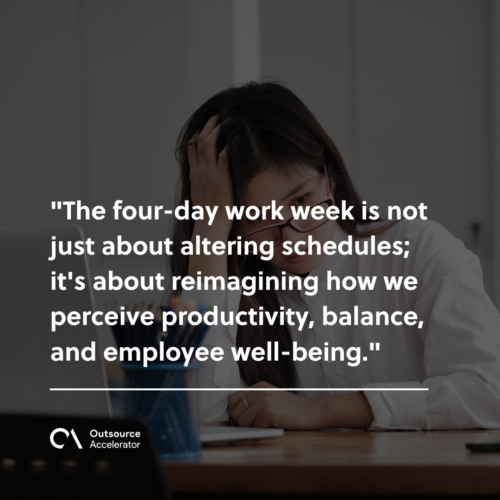10 companies with a four-day work week

List of companies with a four-day work week
As a business owner, a four-day workweek might sound like a radical shift. Yet, it’s become an innovative approach embraced by several successful companies globally.
This article explores the ten companies with four-day work week and why you should consider joining them.
Positive effects for companies with four-day work week
According to research by the University of Cambridge, a shorter work week can significantly boost employee well-being while maintaining or improving work quality.

Overall, this type of work arrangement helps with the following:
- The concept revolves around efficiency. Employees with a shorter work week prioritize tasks better.
- A longer weekend allows for a better work-life balance. It gives employees more time for personal pursuits, family, and relaxation.
- A four-day work week leads to decreased stress levels, ultimately improving mental health and overall satisfaction within the workforce.
- Companies that have embraced the four-day work week reduced absenteeism and higher employee retention rates. It’s a compelling factor for attracting and retaining top talent in competitive industries.
Negative effects for companies with four day work week
While the concept sounds enticing, there are considerations to ponder, especially the following challenges:
- Potential disruptions in client services, particularly maintaining continuous service or production, which might challenge certain industries or roles.
- Adapting to compressed schedules and ensuring equitable workload distribution.
- Customer expectations and operational needs must be carefully managed to prevent any negative impact on business outcomes.
- Ensuring effective communication and collaboration among teams becomes crucial. A shorter work week demands more focused and streamlined communication to maintain efficiency.
These negative effects prove that transitioning to a four-day work week requires meticulous planning.
10 companies with four-day work week
Below is the list of companies with four-day work week:
1. Buffer
Buffer implemented a four-day workweek due to COVID-19 and other reasons.
The CEO, Joel Gascoigne, pushed for a trial in May 2020. It resulted in increased productivity and improved general well-being among team members.
As a result, Buffer shifted to a four-day workweek for the rest of the year and will continue it for the foreseeable future.
Benefits of the four-day workweek at Buffer included:
- Increased productivity
- Happiness among 91% of team members
- Improved flexibility for personal responsibilities
- Enhanced focus on intentional engagement cross-functionally
2. Awin
The Awin Group has permanently moved all staff to a flexible workweek after an 18-month trial period.
Employees can work four full days and take one day off per week or work three full days and two half days. Despite the reduced work hours, employees continue to receive their full salary.
Implementing a flexible work week has resulted in positive outcomes, including:
- Improved work-life balance of employees
- Increased productivity
- Better health and well-being
- Improved work quality
- Reduced stress levels
The Awin Group’s gross profit grew by an average of 13% annually from 2019 to 2022, and employee turnover and sick leave days decreased.
3. DNSFilter
DNSFilter’s four-day work week program involves employees working 32 hours a week instead of the traditional 40, with two groups rotating between taking each Friday off.
It allows the company to maintain uninterrupted customer and incident response coverage while letting employees enjoy regular 3-day weekends.
The benefits of shorter working hours for the company include:
- Boosted productivity
- Reduced stress level
- Fewer sick days taken
- Faster completion of complex deliverables
- Improved retention
- Increased employee engagement
DNSFilter plans to complete the pilot program and review all metrics and KPIs to ensure it meets its key objectives.
4. GooseChase
GooseChase introduced Flock Fridays. It is a company version of the four-day week movement during the summer of 2021.
The goal was to maintain or improve productivity while reducing working hours. Its results showed that most employees felt their productivity stayed or increased.
According to this company, transitioning to a four-day work week had its challenges:
- Difficulties with customer-facing roles
- Need for improved time management and efficiency skills
However, it had a positive impact on productivity and goals, employees felt refreshed, relaxed, and energized after the weekend.
5. Kickstarter
Kickstarter is a public benefit corporation. It took a unique approach considering and implementing a four-day work week.
Upon completing its pilot program and deciding to continue the four-day work week, Kickstarter assessed its impact. Employees expressed that the shorter work week allowed them to live more fulfilling lives and return to work feeling refreshed.
The extra day off provided an opportunity to pursue personal projects and experiences, contributing to increased productivity and smarter working methods.
6. Elephant Ventures
About 7 years ago, Elephant Ventures launched its Manila office. It is a fully remote testing and quality engineering services firm.
The firm considered the four-day work week in late June and evaluated it operationally.
Elephant Ventures also noticed that their Manila team, which already works a four-day work week, had experienced a significant boost in productivity.
To implement the four-day work week, Elephant Ventures evaluated its distributed setup and made adjustments to optimize productivity. The organization started the day early to have optimal deep-work cycles when the brain is most effective.
Elephant Ventures extended its work hours slightly in the evening, encouraging a focused break for the entire team during lunchtime.
7. Bit.io
Bit.io employees work a regular eight-hour day from Monday through Thursday, granting them Friday through Sunday off.
This organization believes that the traditional five-day work week is based on outdated norms and has little to do with productivity.
Bit.io decided to run the four-day workweek as an experiment. Two years later, they find their team is productive in a four-day work week, unlike in five.
Employees have more time for their families, creative projects, and personal interests.
8. Bolt
In 2022, Bolt made a significant announcement, revealing its decision to embrace a four-day work week on a more permanent basis. The company conducted a three-month trial, yielding positive results.
According to employee surveys, 94% of respondents desired the program to continue, while 86% reported increased efficiency with their time.
Communication is key in this transition, and Bolt’s first step was implementing “offline days” every Friday. These days, employees are not expected to be online, meetings are not held, and response to requests is not required.
The corporate calendar has also been updated to reflect Friday as an offline day.
9. SOAX
SOAX is a fully remote company that prioritizes work-life balance and employee well-being to boost productivity.
After SOAX implemented a “work from anywhere” approach and flexible working hours. The organization found that introducing a four-day work week with Fridays off could be a natural next step.
The firm believes an additional rest day could allow for more innovative and creative work on the remaining days.
The experiment is set to last six months. It aims to determine whether this schedule is sustainable for their business and employees.
10. Scoro
Scoro is actively working towards popularizing the four-day workweek as a standard practice in businesses.
The organization is dedicated to documenting its journey toward implementing this change on its website and sharing valuable insights.
Scoro aims to provide employees with an additional weekly day off without any salary adjustments.
The company is committed to being radically transparent about the processes and objectives behind its decisions, hoping to inspire others to follow suit. This initiative aligns with Scoro’s core mission of maximizing time efficiency.
Should you switch to a four-day work week?
The four-day work week emerges as a promising paradigm shift.
It’s not just about altering schedules; it’s about reimagining how we perceive productivity, balance, and employee well-being.

Numerous companies have championed this change, and the results are compelling—increased productivity, happier employees, and a better work-life balance.
However, the transition requires thoughtful planning and consideration of potential challenges.
Should you embrace the four-day work week as a business owner?
It’s a decision that warrants analysis, adaptation, and a deep understanding of your company’s unique dynamics.
But one thing is clear – the potential benefits are worth exploring, paving the way for a more efficient, satisfied, and motivated workforce.







 Independent
Independent




